MCAA Releases Tech Research Report on Safety Apps
At the 2017 Safety Directors Conference, Sean McGuire, MCAA’s Director of Construction Technology, presented the findings from the latest MCAA Technology Research Series on Safety Applications. The new study, produced independently by JBK Labs, focuses in on apps that can be used by companies to document, report, organize and even predict future incidents.
[Download the MCAA Safety App Report]
The report compares 13 different applications available on the market today that can perform a variety of features. These range from basic compliance apps that can import current safety forms and digitize them to more hi-performance apps geared specifically towards safety inspectors.
The report also identified an emerging technology within safety apps – predictive analytics. While some apps focus on merely storing data for reporting and legal purposes, there are two apps on the market that are leveraging that data through machine learning using it to predict higher probability of safety occurrences. As Rob McKinney of JBKnowledge, a former safety director and the principal researcher for the report put it, “Predictive analytics in safety apps is a game changer for the entire construction industry. When you consider how much effort is spent on avoiding accidents and zero injury worksites, having a predictive tool that can call out potential risks can only be seen as a positive benefit.”
The MCAA Construction Technology Committee is working with the Safety Committee to put together a taskforce to further research predictive analytics in safety. Volunteers from the taskforce are field testing the apps with the help of JBKnowledge in an effort to evaluate the benefits of the software and produce a supplemental report for the research. The supplemental report is expected to be completed in the third quarter this year.
MCAA also provided a supplemental webinar, hosted by JBKnowledge’s Rob McKinney, the report’s principal author. To get additional detail, click on the webinar below.
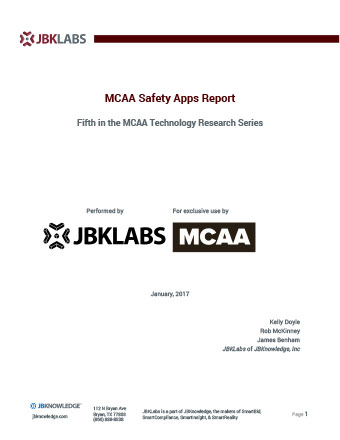


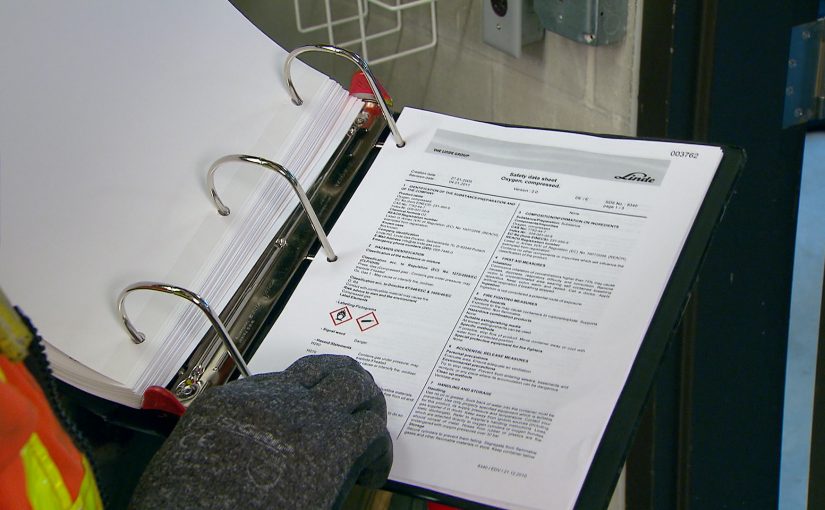


 Year number four of that pledge just ended; the fourth $10,000 installment just arrived! That’s how Anvil rolls when it comes to supporting the Foundation!
Year number four of that pledge just ended; the fourth $10,000 installment just arrived! That’s how Anvil rolls when it comes to supporting the Foundation! The new updated EPA safe handling requirements for refrigerants under Section 608 of the Clean Air Act went into effect January 1, 2017. This includes a provision that reclaimed refrigerants, including CFCs, HCFCs, HFCs and HFOs, may not be resold unless it has been reclaimed by a certified reclaimer. In addition, the rule requires the following:
The new updated EPA safe handling requirements for refrigerants under Section 608 of the Clean Air Act went into effect January 1, 2017. This includes a provision that reclaimed refrigerants, including CFCs, HCFCs, HFCs and HFOs, may not be resold unless it has been reclaimed by a certified reclaimer. In addition, the rule requires the following:



 will have their projects memorialized as MCAA Management Methods Bulletins. All of the 2016 topics are technology-oriented to act in concert with MCAA’s Construction Technology Initiative. The top four for 2016 are:
will have their projects memorialized as MCAA Management Methods Bulletins. All of the 2016 topics are technology-oriented to act in concert with MCAA’s Construction Technology Initiative. The top four for 2016 are:
 are more immediately ready for publication than others, every effort from every team advances the state of the industry’s best practices. No losers, only winners…us!
are more immediately ready for publication than others, every effort from every team advances the state of the industry’s best practices. No losers, only winners…us!
 Arden Building Companies, LLC (Pawtucket, RI) have contributed an additional $1,000 to MCERF, bringing their total contribution to $5,200 to the
Arden Building Companies, LLC (Pawtucket, RI) have contributed an additional $1,000 to MCERF, bringing their total contribution to $5,200 to the 
 The report includes surveys on BIM strategies, mobile integration, cloud security and ways that contractors are implementing technology practices within their company. In each section, the popularity of different software types are reported and insight into spending and management of technology initiatives are provided. As the report’s sponsor, MCAA has an added benefit of segmenting out responses from mechanical, plumbing and service contractors to add further definition on later research studies.
The report includes surveys on BIM strategies, mobile integration, cloud security and ways that contractors are implementing technology practices within their company. In each section, the popularity of different software types are reported and insight into spending and management of technology initiatives are provided. As the report’s sponsor, MCAA has an added benefit of segmenting out responses from mechanical, plumbing and service contractors to add further definition on later research studies.
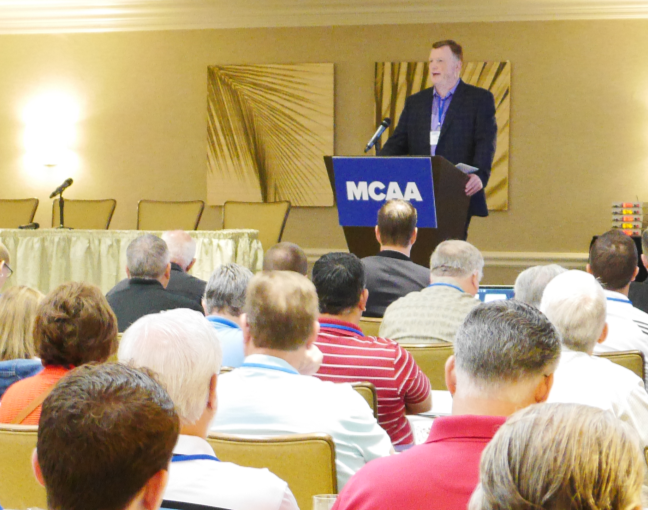
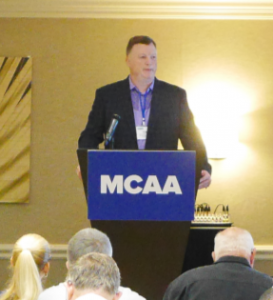 MCAA President, Tom Stone, kicked-off the conference by sharing an update on current initiatives. From the Institute for Project Management (created in the late 1980’s), to the Field Leaders Conference (MCAA’s newest education program), to the reinvented website where MCAA members can download every resource for free, President Stone reinforced the benefits of membership in MCAA, the Education Association.
MCAA President, Tom Stone, kicked-off the conference by sharing an update on current initiatives. From the Institute for Project Management (created in the late 1980’s), to the Field Leaders Conference (MCAA’s newest education program), to the reinvented website where MCAA members can download every resource for free, President Stone reinforced the benefits of membership in MCAA, the Education Association. portance of ever-changing technology was overviewed by MCAA Director of Construction Technology, Sean McGuire. Bob Snyder (conference committee chairman and President of Binsky & Snyder), Tim Brink (MCA of Eastern PA) and Dan Bulley (MCA of Chicago), joined McGuire in a panel discussion and showcased how their individual associations and companies have benefited from embracing current trends and have been guided by MCAA’s technology initiatives.
portance of ever-changing technology was overviewed by MCAA Director of Construction Technology, Sean McGuire. Bob Snyder (conference committee chairman and President of Binsky & Snyder), Tim Brink (MCA of Eastern PA) and Dan Bulley (MCA of Chicago), joined McGuire in a panel discussion and showcased how their individual associations and companies have benefited from embracing current trends and have been guided by MCAA’s technology initiatives.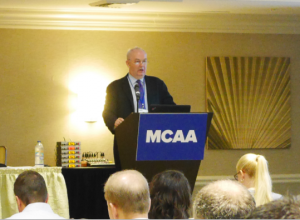 ce to discuss the importance of diversity and workplace sensitivity and reviewed new laws and policies that have been put into place to protect employees. Estabrook and Manzo also engaged attendees and encouraged group participation in a Battleship style game where two teams competed by correctly answering challenging questions about proper uses of industry funds.
ce to discuss the importance of diversity and workplace sensitivity and reviewed new laws and policies that have been put into place to protect employees. Estabrook and Manzo also engaged attendees and encouraged group participation in a Battleship style game where two teams competed by correctly answering challenging questions about proper uses of industry funds. CAA’s Government Affairs Committee Chairman, Bill Albanese and MCAA’s General Counsel, John McNerney. Albanese and McNerney offered some insight to what regulations and legislation might look like under the new administration as well as discussed the importance of PAC contributions and thanked those who continue to support the endeavors of MCAA’s PAC.
CAA’s Government Affairs Committee Chairman, Bill Albanese and MCAA’s General Counsel, John McNerney. Albanese and McNerney offered some insight to what regulations and legislation might look like under the new administration as well as discussed the importance of PAC contributions and thanked those who continue to support the endeavors of MCAA’s PAC. nto the mechanical contracting field. They reviewed how Colorado has set up such a successful program and offered insight as to how others could increase the value of their student programs.
nto the mechanical contracting field. They reviewed how Colorado has set up such a successful program and offered insight as to how others could increase the value of their student programs.


 members of the association perceive great value in the work the Foundation does on behalf of the industry and that he looks forward to working with the Foundation for years to come.
members of the association perceive great value in the work the Foundation does on behalf of the industry and that he looks forward to working with the Foundation for years to come.